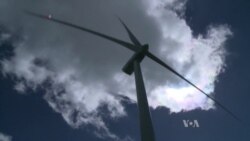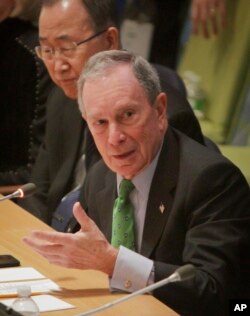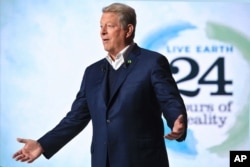While the country awaits a decision from former New York City Mayor Michael Bloomberg on a possible 2016 bid for the White House, he continues to spread a message on global warming.
On Wednesday, Bloomberg addressed a crowd of investors, policymakers and business representatives at the U.N.-hosted Investor Summit on Climate Risk with a simple request to the public: Keep pushing for change.
"The public is upset with all of those who say, 'There's nothing going on,' and then there's a flood where there wasn't water before,” he said. “And then there's a drought where there used to be lots of water, and the ski resort that they want to go to doesn't have any snow."
He said the private sector and cities across the United States have made significant progress, while other institutions have failed.
"Fundamentally it's fair to say the American federal government has done nothing, state governments have done a little, but cities — along with the private sector — have closed 200 out of the 500 coal-fired power plants in America," Bloomberg said.
The three-term mayor and billionaire philanthropist, who was appointed the U.N. secretary-general's Special Envoy for Cities and Climate Change in 2014, has long established himself as a champion for climate change policy.
Internationally, he praised the Chinese government, which he said doesn't receive enough credit for its recent initiatives on climate change, including a ban on smoking and the closure of four power plants in Beijing.
‘Clean Trillion’ challenge
Last month, an international climate conference in Paris produced an agreement to limit global warming to "well below" 2 degrees Celsius above pre-industrial levels.
In an emotional address at Wednesday's summit in New York, Christiana Figueres, executive secretary of the U.N. Framework Convention on Climate Change, said that by 2030, the chapter on high carbon fossil fuels must be closed.
"There is a huge impact if we put money into the wrong fuels, into the wrong energy systems,” she said. “We're going to be dealing with those greenhouse gas emissions to the point where we will not be able to stay well below 2 degrees."
The summit's organizer, Ceres — a nonprofit sustainability advocacy organization — hopes to accomplish what it has coined the "Clean Trillion" challenge: a renewable energy investment goal of $44 trillion, or $1 trillion per year, among the world's leading businesses and investors.
U.N. Secretary-General Ban Ki-moon said clean energy investment stood at $330 billion in 2015, more than six times higher than it was in 2004. He called the progress "a good down payment," but called for more.
"Markets now have a clear signal they need to unleash the full force of human ingenuity and scale up investment that can generate low emissions with resilient growth,” he said. “The world now counts on [the investor community] to act at the speed and skill needed to transform the global economy."
Motivating to action
The summit's keynote speaker, former U.S. Vice President Al Gore, fired up the crowd of investors with a simple question: Must we change?
"Hell, yes, we have to change!" he exclaimed.
The answer to his second question — “Can we change?” — was no different.
Gore argued that the cost of renewable energy and energy efficiency will sharply decline in coming years, providing nations with a practical ability to do more.
The investment community, he said, has an important role in leading that effort.















